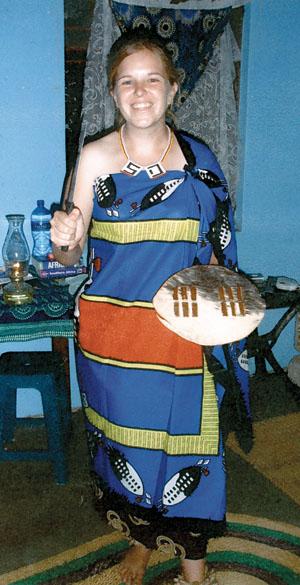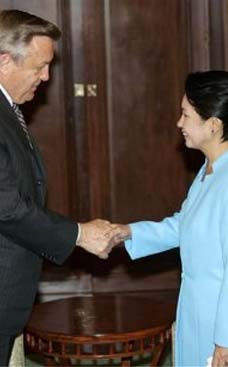
The training period prepared O’Brien for the rigors of working in a rural Swaziland community. Within the first week, though, five of the Peace Corps members chose to return to the States for various reasons. “There were definitely challenging times when things were very difficult and I thought about home more, but I knew I had to finish,” O’Brien recalled. While living in one of Swaziland’s rural communities, O’Brien worked with a native counterpart and lived with a family, which allowed her to build many individual relationships. “You become part of the family, which helps you integrate into the community,” O’Brien explained. Living in a rural community meant taking residence in a cinderblock house with no electricity or running water. That was a stark contrast from other parts of Swaziland — which is one of the more developed African nations. “You’ll see Mercedes cruising around in the capital, but most of the population doesn’t have running water,” O’Brien commented. Becoming part of the community and building individual relationships became more important as O’Brien spent more time in the country working with HIV. “I came in with lofty goals, but as you sit back and take everything in you realize that relationships are really important,” she explained. “If I could just get one of my friends or one of the girls I worked with in my mentor group to get tested or think about protecting themselves that was success. Impacting personal relationships was just more important to me,” she remarked.
Peace Corps experience in Swaziland changes Brigid O’Brien’s life
Peace Corps experience changes C.C. woman’s life
By Matt Barnes, Staff writer
Published: Monday, March 5, 2007 8:25 AM CST
Caption: Brigid O’Brien of Charles City displays some of the items she brought back from Swaziland, where she served for over two years in the Peace Corps. The Peace Corps celebrated its 46th anniversary last week.
On Christmas day, Charles City’s Brigid O’Brien set foot on American soil for the first time in over two years. This meant she returned to a home with running water and electricity. Everyone spoke English. And, she was back in a country where a deadly virus didn’t have a chokehold around almost half of its population.
O’Brien, 25, had just returned from Swaziland, an African country where she had spent 26 months volunteering in the Peace Corps. The small southern African nation has the highest HIV prevalence rate in the world at around 40 percent — a number which is still climbing, but thanks to volunteers like O’Brien, awareness and HIV education is being passed across the nation in an effort to stop HIV’s spread.
O’Brien is one of the most recent of thousands of volunteers who have returned from overseas volunteer service as part of the Peace Corps, which celebrated its 46th anniversary this past week.
Although the work isn’t glamorous, she will tell you that the Peace Corps clich/ — “the toughest job you’ll ever love” — holds true.
“It definitely changes you,” O’Brien remarked. “It will affect my path and next step in life.”
Uncle was in Peace Corps
The journey to Swaziland began when O’Brien was an undergraduate student at Gonzaga University in Spokane, Wash., when she went on a service trip to Zambia.
“My experience at Gonzaga emphasized social justice,” O’Brien said.
She also said that her family was conducive for her to pursuing volunteer work. An uncle had previously been involved with the Peace Corps.
It didn’t take much to convince O’Brien, who had just entered her senior year of college to sign up with the Peace Corps.
“I went to a meeting on campus and I was sold,” she said.
After beginning the long application process in October 2003, which included interviews, essays and numerous medical tests (O’Brien joked that having really good teeth was the key to getting in), she was accepted into the corps and left for Swaziland one year later.
When joining the Peace Corps, you can’t choose which country you travel to, but instead pick a region and what sort of volunteer service you want to participate in. The Peace Corps then assigns you to a country.
O’Brien knew she wanted to go back to Africa and deal with HIV. The prevalence of HIV in Africa didn’t deter her.
“It was a motivating factor,” O’Brien said. “I told them I wanted to be in Africa and work with HIV.”
O’Brien said she always had an interest in HIV since giving a presentation in high school, so when she took off from Philadelphia with 34 others for Swaziland, it was a feeling of nervous anticipation.
“I had no idea what to expect. You leave with a lot of expectations even though you’re not really sure what it’s going to be like,” O’Brien said.
Different culture
What she found was a peaceful country, that was very accepting of the help she and the others traveling with her were willing to give.
Swaziland is composed of one ethnic group, so it has not been touched by some of the brutal civil war that has ravaged other African countries. But, having one ethnic group can be misleading, according to O’Brien.
“A huge misconception is that Africa is homogeneous, but it’s so diverse. I think people label it as one country, where it’s really made up of 62 diverse nations,” O’Brien explained.
One of the first things that the Peace Corps group had to do was go through a community-based training period, which brought O’Brien and other Corps members up to speed on language and cultural differences. O’Brien learned to speak Siswati — the native language, but was already familiar with the country’s second language — English.
“We learned how to be respectful and fit into the culture, to do things that wouldn’t offend elders or people you were working with in the community,” O’Brien said.
One of the things that was stressed in her training was not to accept anything with her left hand — doing that would be disrespectful.
Also during the training period she learned about HIV’s effect on Swaziland and how it fit into the culture.
The training period prepared O’Brien for the rigors of working in a rural Swaziland community. Within the first week, though, five of the Peace Corps members chose to return to the States for various reasons.
“There were definitely challenging times when things were very difficult and I thought about home more, but I knew I had to finish,” O’Brien recalled.
While living in one of Swaziland’s rural communities, O’Brien worked with a native counterpart and lived with a family, which allowed her to build many individual relationships.
“You become part of the family, which helps you integrate into the community,” O’Brien explained.
Living in a rural community meant taking residence in a cinderblock house with no electricity or running water. That was a stark contrast from other parts of Swaziland — which is one of the more developed African nations.
“You’ll see Mercedes cruising around in the capital, but most of the population doesn’t have running water,” O’Brien commented.
Becoming part of the community and building individual relationships became more important as O’Brien spent more time in the country working with HIV.
“I came in with lofty goals, but as you sit back and take everything in you realize that relationships are really important,” she explained. “If I could just get one of my friends or one of the girls I worked with in my mentor group to get tested or think about protecting themselves that was success.
Impacting personal relationships was just more important to me,” she remarked.
As O’Brien worked in the high schools teaching life skills or women’s empowerment or worked with different groups in the community, she realized how much HIV affected the people in Swaziland. She said that all her work centered around HIV in some way.
“Even if it wasn’t directly related — like, if I was teaching kids, the motivation would be HIV — it permeates everyday life.
“There’s so many funerals, I couldn’t stand seeing babies getting sick — it was just hard to see,” she said.
One of the biggest challenges that O’Brien faced was dealing with her desire to do more.
“I sometimes wished I could do more and had the resources to do more for the community,” she remarked.
According to O’Brien, the HIV prevalence rate is still on the rise, but “there’s always hope.”
“A lot of it is in the hands of our youth and the direction they will take,” O’Brien said.
She said that continued education and women’s empowerment, along with economic and medical advances will reverse the growing prevalence percentage.
Despite the grim outlook, O’Brien believes she made progress providing HIV information to the people she came in contact with.
“It’s hard to measure how much of an impact you’ve made, but I feel good about my relationships and that I did make an effort,” she said.
The impact she made on her trip may have affected her the most.
“I feel like I’ve benefitted more from it because it was a life-changing experience for me,” O’Brien remarked.
‘Fast-paced’ C.C.
“It was really hard to say good-bye,” O’Brien said about her departure in December.
After building so many relationships O’Brien had a tough time leaving, but also had a tough time saying ‘hello’ again to life in the United States.
“When you come back and think that Charles City is fast, you know the pace of life was slow over there,” O’Brien said.
O’Brien, who is currently taking classes at the University of Northern Iowa, said she’ll miss the joy that the people of Swaziland found in everyday life, even though they were surrounded by so much sadness.
She does, however, recommend giving the Peace Corps a try if you are interested.
“You have to know your motivation or why you want to join, though,” she said.
Only 18 of her original group of 34 lasted the full two years in Swaziland.
O’Brien cited Peace Corps challenges and cultural difference as two of the main obstacles she overcame.
Swaziland just recently allowed Peace Corps members to enter its borders, and O’Brien’s group was only the second in, which left a lot of logistics unsolved.
“The interesting part is that it’s tough in ways unexpected. You have this image of what you think it’s going to be like and it’s hard to anticipate what will challenge you.
“If you want to challenge yourself or volunteer for a good cause, I would definitely (join the Peace Corps).”
Contact Matt Barnes at
mattb@charlescitypress.com or
(641) 228-3211, ext. 21



















